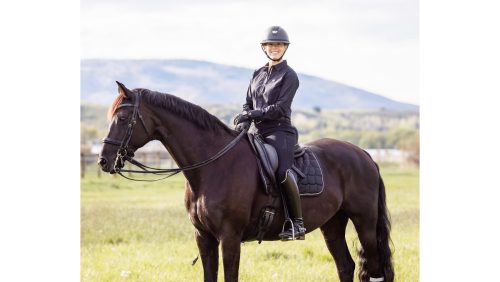Desert International Horse Park has been released from EHV-1 quarantine, with no horses or barns on grounds remaining in isolation and no positive EHV-1 tests for the past two weeks.
The lifted quarantine marks the end of a nearly six-week saga since the first horse at the Thermal, California, showgrounds, developed neurological symptoms and was confirmed positive for equine herpesvirus myeloencephalopathy, the neurological version of EHV-1, on Feb. 11. Since that first case, in which a 12-year-old gelding and two barn mates developed EHM, 32 other horses developed fever-only EHV-1 from exposure at the show grounds, and dozens more cases developed in other counties from horses returning from Thermal.
“Over the last few days we have received the final set of tests that we were waiting for on the horses that remain in isolation and quarantine, as well as any horses on the property with reported fevers,” horse park CEO Steve Hankin posted late Tuesday to DIHP’s website. “The two remaining horses in isolation were swabbed on Monday and tested today. Both tests came back negative. As a result, both horses will be released from isolation. The remaining barns under quarantine were released on Saturday and Monday. No barns are under quarantine at this point.
“The state has officially ended their regulatory oversight of the horse park,” the statement continued.
He noted that one horse on the grounds has had a fever for the past week and remains in veterinary care. However, it has tested negative, and it does not impact the horse park’s status with the California Department of Food and Agriculture, which has overseen this outbreak and others going on in the state.
Barns in several other California counties that have been under quarantine are expected to be released this week as well, pending final negative test results, CDFA representative Dr. Katie Hatch said in an email.
ADVERTISEMENT
Those barns include a facility in Santa Barbara County where a horse was confirmed EHV-1 positive Feb. 23 after returning from DIHP, and an 86-horse Orange County barn where EHV-1 was confirmed among a cohort of horses that had returned to their home facility after showing at DIHP. On Feb. 24, one of those horses was confirmed positive for EHV-1 while another horse at the same barn, who had not attended the show but was exposed to the returning horses, developed severe neurological EHM symptoms and was euthanized. Over the following two weeks, an additional 21 horses at the facility developed EHV-1 with fever only, and one other horse developed EHM and was euthanized.
Several other facilities are waiting on previously ill horses to get their second negative test seven days apart, and then they, too, will be released from quarantine, Hatch said.
Statewide, including barns with no known connections to the cases at DIHP, no new EHV-1 cases have been confirmed by CDFA since March 17.
Equine events have been suspended in California through March 31, per a request issued by the state veterinarian to help halt the spread of EHV-1. They will resume under USEF Return to Competition protocols instituted since the start of the outbreak.
EHV-1 Resources:
• Read all of the Chronicle’s coverage of the 2022 California EHV-1 outbreak.
• Learn more about biosecurity best practices recommended by USEF.
• See the most recent case numbers and quarantine alerts from CDFA.
• Learn more about EHM and EHV-1 from CDFA’s EHM factsheet.














